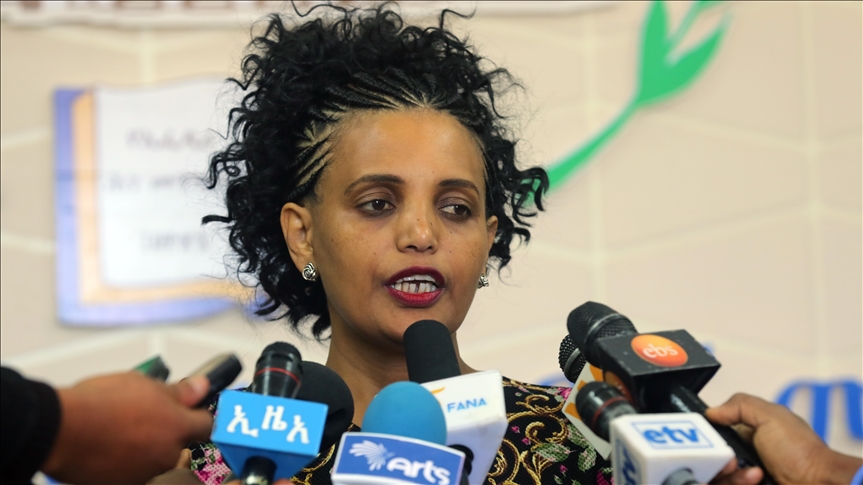
ADDIS ABABA, Ethiopia
On Nov. 22, 2018, Ethiopian Prime Minister Abiy Ahmed surprised Ethiopians by appointing Birtukan Mideksa, a former high profile women leader of the opposition party, as the new Chairperson of the National Electoral Board (NEBE), which had been accused of being a state instrument in the past five elections.
Her appointment was endorsed by a 745-seat parliament with four no votes and three abstentions. She enjoys bipartisan support.
As of the coming Monday and throughout September, Mideksa will oversee the much-awaited two rounds of the 6th national elections, which were delayed twice due to COVID-19 pandemic, administrative, and security problems.
The polls involve some 37.4 million registered voters and 9,300 candidates fielded by 47 political parties and scores of independents vying for the 745-seat federal parliament and councils of 10 regional states.
However, due to irregularities in printing ballot papers and security considerations, the elections in Hareri and Somali regional states and districts in Oromia and Benishangul Gumuz states will be held in a second-round on Sept. 6.
As sporadic fighting between the Ethiopian federal army and the militia of the outlawed Tigray People's Liberation Front (TPLF) has continued in some parts of Tigray, so polls would not take place in the region, which is being administered by an interim administration.
Long, arduous journey
Mideksa, 47, a law graduate from Addis Ababa University, began her career as a federal court judge in 2002 and went into conflict with the government due to her rulings that led her to resign.
In 2005, she entered politics and became one of the founders of the opposition Coalition for Unity and Democracy (CUD) coalition.
Following the post-poll violence of the 2005 elections in which CUD achieved significant votes, Mideksa was among opposition leaders who were accused of treason and jailed for life.
In July 2007, she was pardoned after 18 months behind bars. However, she was rearrested in December 2008, after her pardon was revoked, and she spent 21 months in detention. She was freed in October 2010.
A year later, she resigned from politics went to exile in the US.
'Highly respected and crucially independent'
Human Rights Watch, which had all the way condemned Mideksa's imprisonment as "politically motivated" and campaigned for her release, was quick in hailing her appointment as" another step in the right direction."
"There was good news from Ethiopia as former opposition leader, lawyer and judge Birtukan Midekssa was named head of the National Electoral Board of Ethiopia (NEBE)," the right body said in a statement it issued on the day the appointment.
"Following years of almost completely closed political space, Ethiopia's government continues to institute an important series of reforms. The appointment of a highly respected – and crucially, independent – new elections chair is another step in the right direction," the statement added.
In a previous interview with Anadolu Agency, Yeshewas Assefa, one of the deputy chairpersons of Ethiopia's biggest opposition party, Ethiopian Citizens for Social Justice, commended Mideksa's integrity and her contribution to Ethiopia's multi-party democracy.
On her appointment, Assefa noted: "In our view, the appointment of Birtukan Midekssa is an admission of the fact the National Election Board was favorably biased towards the ruling EPRDF party (a former four-party coalition that ruled Ethiopia for 27 years until 2018), which won five fake national elections."
Civic duty
Mideksa, a single mother of a daughter, returned to Ethiopia in November 2018, after seven years of exile in the US, where she received a Master of Art (M.A.) in Public Administration from Harvard University.
Upon her appointment, she told reporters that she was encouraged to return home by the ongoing reforms of the Ethiopian government that "has proved its commitment for a genuine and true democracy."
"Even though there's still a lot to be done, we see institutional reforms in many directions. These are good opportunities," she noted. -.
Daunting challenge
Mideksa repeatedly stated that the daunting challenge set before her was restoring the lost electoral integrity of NEBE and running fair and free elections.
An opposition party official who asked for anonymity due to his party's instruction that does not allow him to speak to the media about the board before the end of the elections told Anadolu Agency that Mideksa had been" performing well and exhibited independent."
"But the integrity of polls and NEBE are not solely determined by the ability and determination of its leader and capabilities of the reformed electoral body," he added.
"The behaviors of the state which had aborted Ethiopia's transition to democracy over the last three decades, attitudes of society and election workers play a significant role in making the polls credible. All the same, the polls would be a test for Mideksa."
Anadolu Agency website contains only a portion of the news stories offered to subscribers in the AA News Broadcasting System (HAS), and in summarized form. Please contact us for subscription options.


